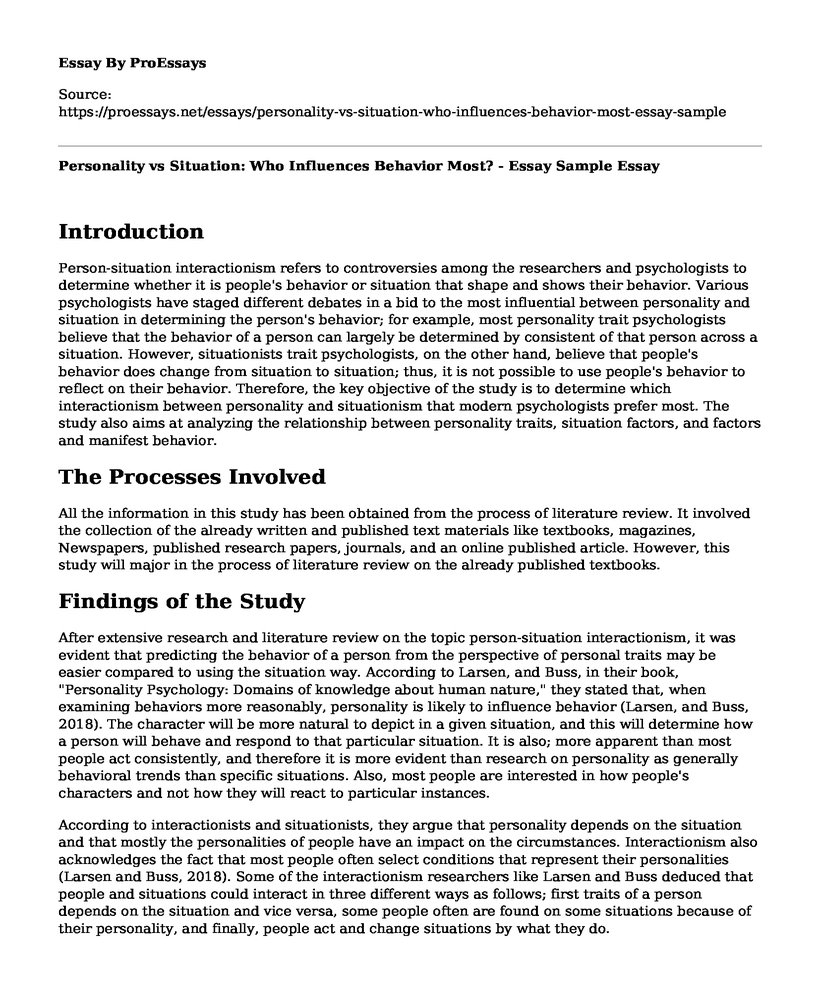Introduction
Person-situation interactionism refers to controversies among the researchers and psychologists to determine whether it is people's behavior or situation that shape and shows their behavior. Various psychologists have staged different debates in a bid to the most influential between personality and situation in determining the person's behavior; for example, most personality trait psychologists believe that the behavior of a person can largely be determined by consistent of that person across a situation. However, situationists trait psychologists, on the other hand, believe that people's behavior does change from situation to situation; thus, it is not possible to use people's behavior to reflect on their behavior. Therefore, the key objective of the study is to determine which interactionism between personality and situationism that modern psychologists prefer most. The study also aims at analyzing the relationship between personality traits, situation factors, and factors and manifest behavior.
The Processes Involved
All the information in this study has been obtained from the process of literature review. It involved the collection of the already written and published text materials like textbooks, magazines, Newspapers, published research papers, journals, and an online published article. However, this study will major in the process of literature review on the already published textbooks.
Findings of the Study
After extensive research and literature review on the topic person-situation interactionism, it was evident that predicting the behavior of a person from the perspective of personal traits may be easier compared to using the situation way. According to Larsen, and Buss, in their book, "Personality Psychology: Domains of knowledge about human nature," they stated that, when examining behaviors more reasonably, personality is likely to influence behavior (Larsen, and Buss, 2018). The character will be more natural to depict in a given situation, and this will determine how a person will behave and respond to that particular situation. It is also; more apparent than most people act consistently, and therefore it is more evident than research on personality as generally behavioral trends than specific situations. Also, most people are interested in how people's characters and not how they will react to particular instances.
According to interactionists and situationists, they argue that personality depends on the situation and that mostly the personalities of people have an impact on the circumstances. Interactionism also acknowledges the fact that most people often select conditions that represent their personalities (Larsen and Buss, 2018). Some of the interactionism researchers like Larsen and Buss deduced that people and situations could interact in three different ways as follows; first traits of a person depends on the situation and vice versa, some people often are found on some situations because of their personality, and finally, people act and change situations by what they do.
The relationships that exist between personality traits, situational factors, and manifest behavior are as follows; persona trait perspective holds that a given person is likely to act consistently over time and that it is justifiable for one to determine a person's behavior using the personal trait. On the other hand, situation factors argue that the behavior of a person is being influenced by the kind of situation that a person is facing, and that situation can be used to measure behavioral variability over time. And manifest behavior refers to a situation where people's actions are determined by what they have decided to focus their mind on and believe. Manifest is also a situation where people strongly believe in something. Thus their behavior will be determined by what they believe (Research article, 2017).
Conclusion
In conclusion, most behavioral researchers have concluded that both the situation and person's traits determine behavior. For example, various researchers argue that situational factors can are more conclusive when predicting specific situations, while a person's traits are more descriptive when it is a matter of determining behavior across situations.
Reference
Larsen, R., and Buss, D.M. (2018). Personality Psychology: Domains of knowledge about human nature. (6th Ed). New York, NY: McGraw-Hill Education.
Research article; investigating the association between social interactions and personality states dynamics.Published:20 September 2017. Retrieved from https://royalsocietypublishing.org/doi/full/10.1098/rsos.170194.
Cite this page
Personality vs Situation: Who Influences Behavior Most? - Essay Sample. (2023, Apr 06). Retrieved from https://proessays.net/essays/personality-vs-situation-who-influences-behavior-most-essay-sample
If you are the original author of this essay and no longer wish to have it published on the ProEssays website, please click below to request its removal:
- The Person Who Inspires Me: Nicki Minaj Essay Example
- Research Paper on Media Influences on Aggression
- Essay Sample on Psychology: A New Science Explored
- My Leadership Plan: Developing Strengths and Understanding Behaviorism
- Stress: Mental Health and Physical Health Linked - Essay Sample
- Paper Sample on 10+ Years Experienced Finance & Accounting Manager
- Personality Class - Free Paper Example







